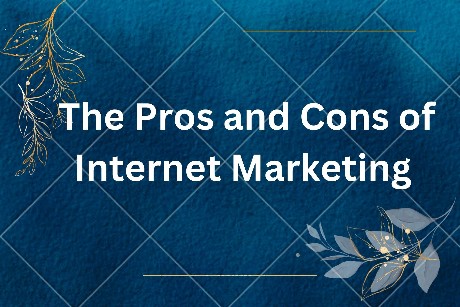The Dynamic Landscape of Internet Marketing: Navigating the Pros and Cons
In the ever-evolving world of business, internet marketing has emerged as a game-changer, offering a myriad of possibilities for companies to thrive in the digital realm. Let’s embark on a journey through the pros and cons of internet marketing, shedding light on how businesses can leverage its strengths while addressing its challenges.

I. The Pros of Internet Marketing
1. Global Reach and Accessibility:
Pro: Internet marketing breaks down geographical barriers, providing businesses with a global reach and making products or services accessible to a diverse audience 24/7.
2. Cost-Effectiveness and Budget Flexibility:
Pro: Compared to traditional marketing channels, online marketing often proves more cost-effective. Additionally, businesses can adjust budgets in real-time based on performance.
3. Precise Targeting and Personalization:
Pro: Advanced analytics tools enable businesses to target specific demographics, personalize content, and tailor marketing efforts to individual customer preferences.
4. Real-Time Analytics and Data-Driven Insights:
Pro: Robust analytics provide real-time data, allowing businesses to track campaigns, understand customer behavior, and make informed decisions to optimize strategies.
5. Diverse Marketing Channels:
Pro: Internet marketing encompasses various channels, including social media, email, content marketing, and search engine optimization (SEO), offering versatility in reaching different audiences.
II. The Cons of Internet Marketing
1. Information Overload and Short Attention Spans:
Con: The internet is flooded with information, and businesses face the challenge of capturing and maintaining audience attention in an environment with short attention spans.
2. Increased Competition:
Con: As businesses flock to online platforms, competition intensifies, necessitating innovative strategies to stand out amidst the crowded digital landscape.
3. Dependency on Technology and Connectivity:
Con: Internet marketing relies on technology and a reliable internet connection. Businesses may face challenges if potential customers have limited access or encounter technical issues.
4. Privacy Concerns and Data Security:
Con: Growing concerns about privacy and data security present challenges, requiring businesses to navigate regulations and establish trust with consumers.
5. Rapid Technological Changes:
Con: The digital landscape evolves rapidly, with new technologies emerging regularly. Staying updated and adapting to these changes is essential but can be demanding.
III. Striking a Balance for Effective Internet Marketing
1. Engaging and Interactive Content:
Recommendation: Create content that engages and interacts with the audience, fostering a sense of connection and encouraging participation.
2. Continuous Learning and Adaptation:
Recommendation: Stay informed about industry trends, technological advancements, and consumer behavior to adapt marketing strategies accordingly.
3. Ethical Data Practices:
Recommendation: Prioritize ethical data practices, ensuring transparency, and gaining consumer trust in an era where data privacy is paramount.
4. Integration of Traditional and Online Marketing:
Recommendation: A holistic approach that integrates traditional and online marketing can capitalize on the strengths of both, reaching a wider audience through multiple channels.
5. Building Authentic Relationships:
Recommendation: Focus on building authentic relationships with customers through personalized communication, transparency, and delivering value consistently.
IV. Navigating the Digital Frontier
Internet marketing, with its vast potential and dynamic nature, offers businesses an unprecedented avenue for growth. By understanding the pros and cons, adapting strategies, and infusing positive energy into their digital presence, businesses can not only survive but thrive in the ever-evolving landscape of internet marketing.

